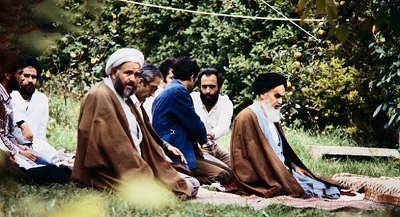- News code: 1228157
- Source: imam-khomeini.ir
Imam Khomeini had undertaken serious discussions in this regard in his famous book titled “The discipline of prayers”
The late founder of the Islamic Republic cites many Hadiths from the infallible and pure Ahl al-Bayt ('a) concerning urging the “presence of heart”. It suffices to translate some texts of those narratives:
The Messenger of Allah is quoted to have said: “Worship Allah as if you see Him. If you do not see Him, He does see you.”
From this noble hadīth two of the degrees of the presence of heart can be realized:
The first is that the sālik discerns the Beauty of the Beautiful, and is absorbed in the manifestations of the Beloved [hadrat-i mahbūb] such that all the ears of his heart will be closed to all other creatures, while the eye of his insight opens to the pure Beauty of the Lord of Majesty, discerning nothing else. That is, he is engaged in the Present [hādir], neglecting the presence [hudūr] and company [mahdar], Imam Khomeini explained.
The second degree, which is lower in rank, is that the sālik sees himself present in His Presence [mahdar] and observes the discipline of the Presence [hudūr] and Company [mahdar]. The Messenger of Allah (s) says: “If you can be of those who are in the first degree, then worship Allah accordingly, or else, do not neglect the fact that you are in the Presence [mahdar] of the Lord.” Naturally, there is a discipline for being in the Presence [mahdar] of Allah, which should not be neglected in respect of the state of servitude.
In a hadīth, Abū Hamzah ath-Thamālī narrates: “I saw 'Alī ibn al-Husayn (PBUH) performing his Salat. His cloak slipped off his shoulders, but he did not try to rearrange it until he finished the Salat. When I asked him about that, he said: “Woe unto you! Do you know at whose service I was?”
The Messenger of Allah was quoted to have said: “Two of my Ummah stand for the Salat, and, although their rukū' and sujūd are the same, the difference between the two Salats is like that which is between the earth and the sky.”
Read more:
Imam Khomeini defined distinction between divine religions and material doctrines

